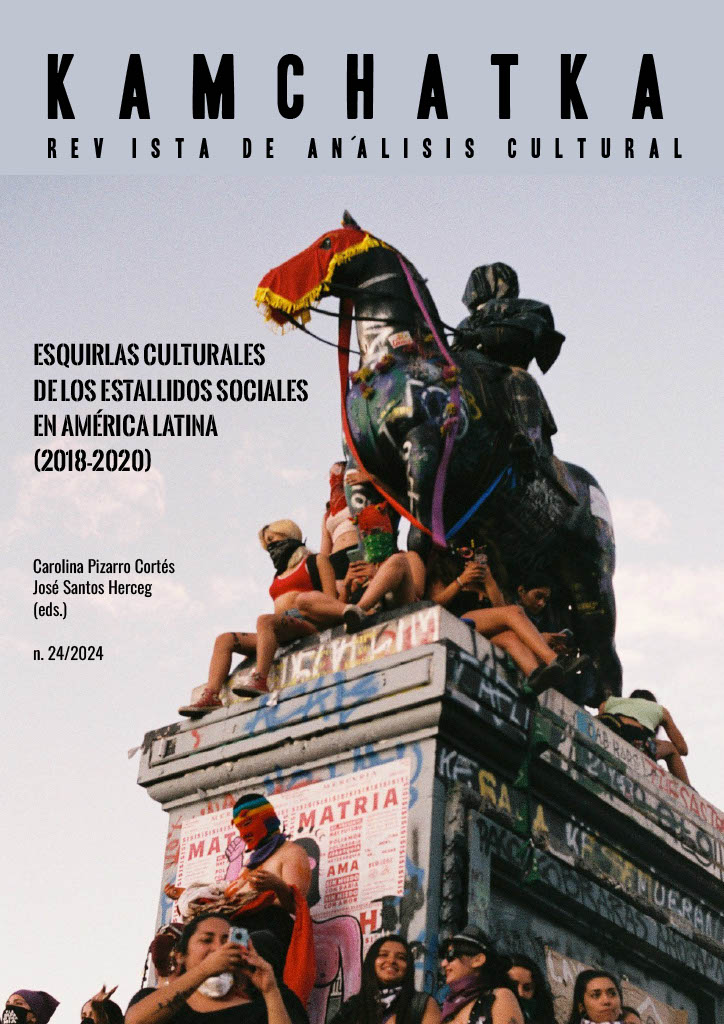Revolted poetry in Chile: approaches to a disappropriate corpus
DOI:
https://doi.org/10.7203/KAM.24.27570Keywords:
Chilean poetry, revolt, disappropriation, communality, quiltra subjectivity Abstract
Abstract
Within the framework of the so-called Chilean
“social explosion” the article reviews a set of poetic expressions that, in the last four years, have poeticized the October revolt from a “quiltra” subjectivity (street dog), committed to the imagination in a way another to live. The corpus considered in this review focuses on a selection of poems, extracted from the texts: ((re)constitución poética, Rebeldía quiltra, El dado, Un oasis en el desierto and Ad Mapu Constituyente. All of which will be read from the critical perspective of a “desapropiada” literature that seeks to intervene in the common from the communal word of a self-convened and rebellious.
 Downloads
Downloads
 References
References
ACERO, Nibaldo y Jorge CÁCERES (2022). Letra revuelta. Literatura, imagen y espacio público en el estallido social. Valparaíso, Chile: Narrativa Punto Aparte.
ANIÑIR, David (2005). Mapurbe. Santiago: Odiokracia Ediciones.
ANIÑIR, David (2020). Ad Mapu Constituyente. Santiago: Archivo Central Andrés Bello / Universidad de Chile. Libro digital disponible en: https://libros.uchile.cl/1135
ANIÑIR, David y AD MAPU 2017 (2017). “Ad Mapu Constituyente”. Revista Anales 13, 435-442.
ARAVENA, Natalia (2023). Ojos memoria de un estallido. Relato de Sobrevivientes con Trauma Ocular. Libro digital disponible en: https://www.instagram.com/ojosmemoriadeunestallido/
ARROYO, Rodrigo (2020). “Construir el descampado”. Espinosa, Felipe y Daniel López (eds.). (re)constitución poética. Santiago: Zanka Editores, 32-37.
BAUMAN, Sygmunt (2005). Vidas desperdiciadas. La modernidad y sus parias. Barcelona: Paidós.
BAUMAN, Sygmunt. Modernidad líquida (2003). Buenos Aires: FCE.
BRITO, Sofía (2020). “Deróguese el artículo 8”. Espinosa, Felipe y Daniel López (eds.). (re)constitución poética. Santiago: Zanka Editores, 40-47.
ECHEVERRÍA, Andrea (2014). “David Aniñir: poesía y memoria mapurbe”. A contracorriente, 3, 68-89.
ESPINOSA, Felipe y Daniel LÓPEZ (2020). (re)constitución poética. Santiago: Zanka Editores.
FOSTER, Hal (2016). “El impulso de archivo”. Nimio, 3, 102-125.
HARTOG, François (2007). Regímenes de historicidad. Presentismo y experiencias del tiempo. México, D.F.: Universidad Iberoamericana.
HERNÁNDEZ, Elvira (2017). Seudoaraucana y otras banderas. Talca, Chile: Universidad de Talca.
HERNÁNDEZ, Biviana (2023). “La épica en proceso de reescritura: Seudoaraucana de Elvira Hernández”. Alpha, 57, 67-81.
KIFFER, Ana (2020). “El odio y el desafío de la Relación. Escrituras del cuerpo y afecciones políticas”. Giorgi, Gabriel y Ana Kiffer (eds.). Las vueltas del odio. Buenos Aires: Eterna Cadencia, 83-134.
LACROIX, Pablo (2020). Un oasis en el desierto. Santiago: Dudo Ediciones.
LARROULET, Vicente y Constanza YÁÑEZ (2022). El dado. Santiago: Dudo Ediciones.
LEONCINI, Estefanía (2019). Rebeldía quiltra. Santiago: Dudo Ediciones.
LUDMER, Josefina (2010). Aquí América Latina. Una especulación. Buenos Aires: Eterna Cadencia.
MARTÍNEZ, Luz Ángela y Jaime HUENÚN (2010). Memoria poética. Reescrituras de La Araucana. Santiago: Universidad de Chile / Cuarto Propio.
MERUANE, Lina (2021). “Matar el ojo”. Zona ciega (ensayo sobre el ojo). Santiago: Random House, 13-54.
MIGNOLO, Walter (2007). La idea de América Latina. La herida colonial y la opción decolonial. Barcelona: Gedisa.
MOLINA, Raúl (2021). Hablan los muros. Grafitis de la rebelión social de octubre de 2019. Santiago: LOM.
OLEA, Raquel (2020). “Literatura y crisis: escribir la dignidad”. Aisthesis, 68, 331-348.
RIVERA Garza, Cristina (2020). Los muertos indóciles. Necroescritura y desapropiación. Santiago: Los Libros de la Mujer Rota.
ROJAS, Sergio (2023). Qué hacer con la memoria de octubre. Valparaíso, Chile: Inubicalistas.
Downloads
Published
How to Cite
-
Abstract1
-
ARTÍCULO PDF (Español)0
Issue
Section
License
Copyright (c) 2024 Biviana Hernandez Ojeda

This work is licensed under a Creative Commons Attribution-NonCommercial 4.0 International License.
This journal provides an immediate free access to the content on the principle that freely make investigation available to the public, which promotes an increased global knowledge exchange.
Unless otherwise indicated, texts published in this journal are under the license Attribution-NonComercial 4.0 by Creative Commons. These texts may be copied, distributed and publicly communicated whenever the publication’s author and title are quoted and whenever they are not used for commercial purposes. In any case, intellectual property of the articles and its potential economic rights entirely belong to its authors.
The full license can be consulted on https://creativecommons.org/licenses/by-nc/4.0/. We encourage authors to disseminate papers published in Kamchatka. Journal of cultural analysis electronically, in institutional digital repository or in their websites.





